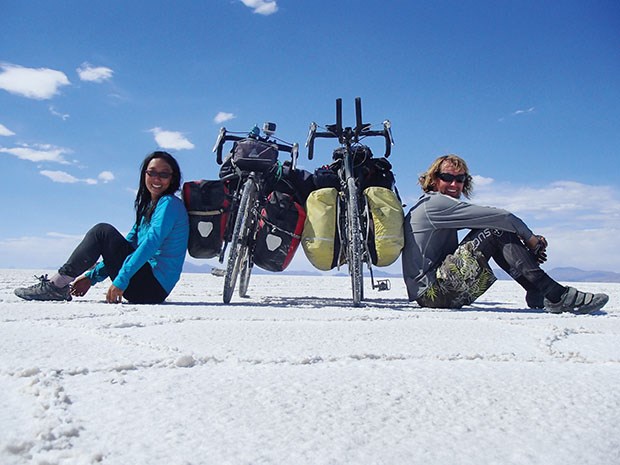Ladner's Bryan Kinshella and Maggie Woo recently returned from a 19-month journey that saw them cycle from B.C. to Buenos Aires.
The trip, which was the couple's honeymoon, saw them return home via boat and train before three more days of cycling from Seattle.
The overall experience was fantastic, Kinshella said, noting they learned Spanish and met many interesting people over the course of their travels.
Woo said they really liked cycling because it got them in touch with the landscapes they traveled through.
The couple passed through small villages, ate farm fresh produce and "stumbled into things you don't see in guide books," she said.
For instance, they found a Carnaval celebration in Guatemala in a little town where they were the only foreigners and were invited up onto one of the floats in a parade, she said.
Another highlight was visiting many natural hot springs going through northern Chile, Kinshella said.
The remote area was at about 4,000 metres of elevation, he said, noting there was hardly anybody around.
Woo said it was one of the toughest parts of the trip, explaining that there was less oxygen due to the elevation, and no shade from the sun during the day and then extremely cold at night.
A surreal moment during the journey was crossing two huge salt flats in Bolivia, she said. They were perfectly flat and white and made you think you were riding across a giant ice rink, she said.
In terms of planning and preparation, they used a guidebook going through the United States, Kinshella said, but once they left the U.S. they bought maps as they went and looked up routes along the way, talking to people to find out what they wanted to see.
They used touring bikes they bought used off Craigslist for the trip.
Cycling is one of the cheapest ways to travel, said Woo.
"You have your transportation. You're carrying your house. You don't need gas.
It's just food," she said.
The couple packed tents, sleeping bags, a little stove and pots. They carried a lot of food.
"We liked the idea of being able to stop anywhere along the way and having
three or four days to get to the next town, instead of having to be there tonight," Kinshella said.
They also had a transmit-only spot satellite GPS tracker.
The trip was also a fundraiser for health and gender equality efforts in western Kenya through an NGO, Community Alliance Network.
A blog of the trip can be found at http://theworldcan.org/biketrip.html.



